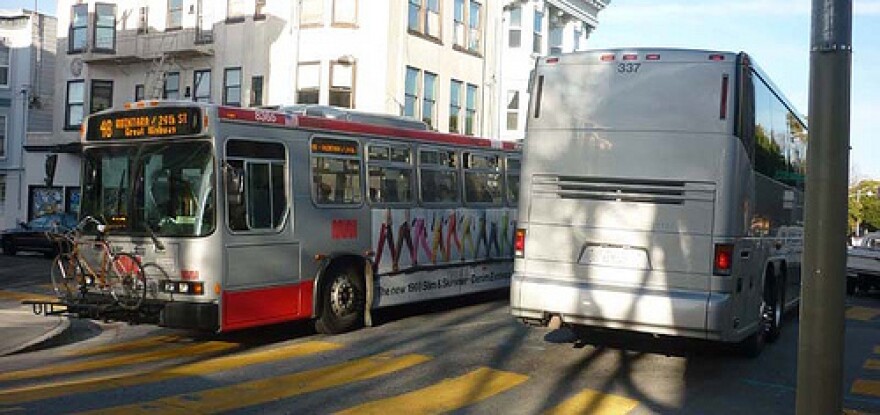Private shuttles have been using Muni stops in San Francisco for a while. But they’ve mostly been smaller buses, for hospitals and universities. In the past few years though, bigger charter buses for tech companies like Google and Genentech have also started to use Muni stops.
In total, the private shuttles regularly use more than 200 Muni stops around the city. San Francisco Municipal Transportation Agency (SFMTA) spokesperson Kristen Holland says the tech buses’ rising popularity has started to cause Muni delays.
“We're very focused on Muni reliability, and it was having an impact, so we wanted to work with (the shuttle providers) to come up with some solutions,” she says.
Holland says it’s hard to quantify the shuttles’ total impact. But one thing the agency can measure is dwell time, or how long it takes to get passengers on and off their buses.
“And for Muni vehicles, that’s about 20 seconds, but for these vehicles, because they have other concerns, it’s about a minute,” says Holland. “So when they’re at that stop, they’re taking a lot longer at that stop than a Muni vehicle would...so that would interrupt the flow of the service.”
Now, if a private car pulls over in a Muni stop, the driver can get a ticket. And although the private buses could be cited, usually they’re not. The companies also don’t pay to use the public stops, which can create the impression they’re getting special treatment. Holland says the SFMTA does get two to three complaints a week, but that the agency tries to resolve them directly -- without issuing tickets.
The city’s also considered a few longer-term solutions. One is just to ban all shuttles. SFMTA officials wanted to know what would happen if they did that, so they sent out staff to survey shuttle riders about their commute habits. Turns out, the shuttles make about thirty-five thousand trips a day. And the survey revealed that without them, almost half the riders would commute by driving alone.
“Which is something that would not help anybody in San Francisco,” says Holland. “So it would be detrimental to not only our congestion, our traffic, and our economy, and our environment, it would be an even larger impact on Muni.”
That’s something the SFMTA definitely doesn’t want. Holland says one of the agency’s main goals is to reduce congestion on city streets, and the buses are doing just that.
“But to a great extent (the shuttle providers) want to use the pre-established transit stops that are part of the Muni stops, so we need to work with them to create this program,” she says.
SFMTA will soon begin a pilot program that would limit the number of Muni stops the shuttles can use to about 100 -- half of what they use today.
“Those would be some of our larger stops, but they would also be stops that don't have as high a frequency of muni service,” says Holland. “We wouldn't want to use a stop like that, or a stop that's a layover.”
The pilot proposes a few other new rules: shuttles will have to be clearly marked, and always give Muni the right-of-way. Buses that violate the new rules will be fined. The SFMTA hasn’t decided on a dollar amount, but the fine would depend on how many stops a shuttle provider makes within the city. More stops mean a higher fine.
According to Holland, the new regulations should make Muni boardings smoother and improve the system’s reliability, while still helping the city keep cars off the road.
Holland says the companies that operate the buses have been responsive.
“It's been a pretty close partnership,” she says.” “Because it won't work if it doesn't meet their needs too.”
A Google spokesperson said the company has no comment about the proposed regulations. A Facebook rep said it’s too early in the process to make a comment.
And it’s true: this pilot program is still a ways off. Holland says next, the SFMTA staff will present the regulations to the agency’s board, and the pilot should start sometime this winter. If all goes well, the SFMTA will look into making the shuttle regulations permanent.






